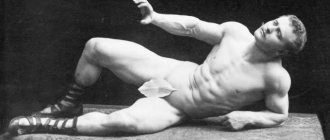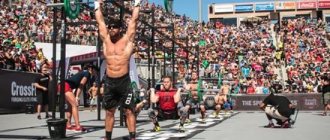Sprinting is running over short distances. The length of the distance can be 60, 100 and 200 meters. It is the hundred-meter paths that originate from Ancient Greece.
This sport fascinates with its elegance, restraint, but at the same time emotional character. High speeds and entertainment attract the viewer, so this sport is considered one of the most relevant, discussed and sought-after sports areas throughout the world. The number of athletes, whether professional or amateur, is quite large and is growing every day.
Usain's success story
Usain St. Leo Bolt is a world-famous track and field athlete, multiple record holder, winner of multiple awards, eleven-time Olympic champion, specializing in short-distance running.
“He doesn’t like to lose,” said the champion’s father. This slogan became a “guiding star” on Usain’s difficult life and sports career.
When Bolt became a World Champion, he was only fifteen years old. Despite the fact that the forces in the competition among juniors were unequal, since his opponents were four years older than him, this did not become a stumbling block on the path to glory among the athletics world. Usain successfully runs a distance of two hundred meters and wins first place. It was clear that Usain was the new rising star of this sport.
In 2007, Usain won silver at the championship in Osaka. The following year, Bolt set a new world record in the 100-meter dash - 9.72 seconds, breaking the record of athlete Asafa Powell.
Bolt is the first multiple champion to come from Jamaica. At the peak of physical fitness and fame, he wins awards, medals, and sets new records. His sporting heritage is enormous. Having become an eight-time Olympic champion, Usain ended his sports career.
Search
Here are ten of the fastest people on this planet.
1. Usain Bolt
Usain St. Leo Bolt was born on August 21, 1986 in Jamaica. He is a six-time Olympic champion and eight-time world champion. During his performances he set 8 world records. His speed for 100 m is 9.58 seconds
2. Michael Dwayne Johnson
Michael was born on September 13, 1967 in Dallas. He specialized in the 200 and 400 meters. Four-time Olympic champion and nine-time world champion.
3. Tyson Gay
Born August 9, 1982 in Kentucky. Thanks to personal bests, Tyson Gay is the second fastest sprinter on the planet in the 100 meter race and the fifth fastest in the 200 meter race with results of 9.69 s and 19.58 s .
4. Milka Singh “flying singh”
Milka was born in India in 1930 (more precisely, “around the 1930s”). He won the 400m at the 1958 British Empire and Commonwealth Games. He is the first participant in these Games from independent India to win gold, and the only male Indian to win gold in athletics at this tournament. He also won gold at the 1958 and 1962 Asian Games. Milka took part in three Olympics (1956, 1960 and 1964), but never stood on the podium. The 1960 Olympic gold eluded him due to an unfortunate mistake - he ended up finishing fourth.
5. Asafa Powell
Born in Jamaica on November 23, 1982 - 2008 Olympic champion and 2009 world champion in the 4x100 m relay. Former world record holder in the 100 meter race. Personal best - 9.72 seconds .
6. Maurice Green
Maurice Greene was born on July 23, 1974 in Kansas City. He specialized in running 100 and 200 meters. Multiple Olympic champion and world champion. Former 100 m world record holder ( 9.79 s ). Current world record holder in the indoor 60-meter dash. Over the years of his career, he ran out of 10 seconds 53 times in official competitions (the result was later surpassed by Asafa Powell).
7. Frederick Carlton "Carl" Lewis
Born July 1, 1961 in Alabama. Nine-time Olympic champion in sprinting and long jump and eight-time world champion. One of the few athletes who managed to win gold at 4 Olympics in a row in the same event (1984, 1988, 1992 and 1996 - long jump).
Three times in a row (1982, 1983 and 1984) he was recognized as the best athlete in the world. He won the best season result in the world seven times in the long jump (1981-1985, 1988, 1992) and three times in the 200 meters (1983, 1984, 1987). Winner of the Prince of Asturias Award (1996).
8. Nesta Carter
The Jamaican athlete was born on October 11, 1985. Two-time Olympic champion in the 4x100 meter relay as part of the Jamaican team.
9. Alexander Brednev
The fastest Russian was born on June 6, 1988. Champion of Russia at a distance of 100 meters in 2013 with a result of 10.38 . Russian indoor champion 2013 in the 60-meter race. At the 2013 Universiade, he reached the semi-finals. Winner of the 2012 Moscow Challenge competition in the 200-meter race.
10. Nickel Ashmead
Nickel was born on April 7, 1990. He is the 2013 world champion in the 4x100 m relay. In 2013, at the Jamaican championship, he qualified for the 2013 World Championships in Moscow. In the semi-final race of the World Championships in the 100 meters, he improves his personal best - 9.90 , but in the final he takes only 5th place. As part of the relay team in the 4x100 meter race, he takes part in the final race and wins gold medals.
Read on Zozhnik:
SmartReading: Running naturally. An easy way to run without injury
15 surfers + 3 videos
30 handsome black men
How to do stretching correctly. 10 videos
Intermittent fasting for weight loss and muscle building
Bolt's main rival
The second fastest player in the world is Tyson Gay. The Latin American runs the 100 meters not far from Bolt (9.69 seconds).
Tyson admits that Usain inspires him. But despite such sincere speeches, the athlete was caught doping. The scandal broke out in the USA at the World Championships in 2013. No incidents occurred after this situation. In 2006, Tyson first appeared in the ranks of this level. This year brings him a gold medal at the US Championships. Gay runs in 10.07 seconds. Only Gatlin was faster than him, but he was later disqualified for using steroids.
Unique sprinter and jumper Carl Lewis
Carl Lewis is an American sprinter and jumper. In 1983, at the championship in Helsinki, he won three gold medals. Already in 1984, the champion broke Jesse Owens' record by winning 4 gold medals. At the 1988 Olympics, three medals were won, followed by two more golds in 1992. Thus, Lewis became the record holder for the number of medals won (9 in total).
Interestingly, in the 1996 games, the US team raised the question of Lewis's participation. If the athlete won again, he would become a ten-time world champion. For some reason this did not suit the national team, but as you know, the Americans have an inherent principle. The principle of selection for the national team through internal stages. The 35-year-old athlete did not qualify, and the national team lost to the Canadian team.
The cardiovascular system
According to Ohm's End: A Science Fiction for Overcoming Resistance to Lifestyle Change, long-distance runners are the only group of athletes who live longer than non-athletes. Challenging endurance training strengthens the cardiovascular system, which results in increased oxygenation of the bloodstream and the capillaries that supply blood to the muscles. In addition, the muscles of long-distance runners have more mitochondria, which are the energy sources in the cell that use oxygen. And sprinters' muscles have fewer mitochondria, but more enzymes needed for glycolysis, a process that breaks down carbohydrates for energy and does not require oxygen.
Fastest woman in the world
The fastest woman is Griffith-Joyner, the current 100m record holder (10.49 sec) and three-time world champion. Joyner was born in Los Angeles and came fourth at the first world championship. In 1984 she was already second at the same distance. However, in Seoul, at the Olympic Games, she won three gold medals: 100 and 200 m distances, 4 x 100 m relay race. Such an unexpected breakthrough raises doubts among athletes and specialists. Three-time Olympic champion Gwen Torrence does not recognize Joyner's records, and generally believes that she interferes with honest athletes.
In 1989, Griffith-Joyner left the sport and began to have serious health problems. His quick death at the age of 38 only added to the suspicion.
What is a sprint?
Sprint is a competition at a stadium in the program of athletics running disciplines:
- 100 m;
- 200 m;
- 400 m;
- 4x100m relay race;
- 4x400m relay race
Sprinting is also part of technical disciplines (jumping, throwing), track and field all-around and other sports.
Official sprint competitions take place at world championships, Olympic Games, national and continental championships, as well as local commercial and amateur competitions.
Competitions at non-standard distances of 30 m, 50 m, 55 m, 60 m, 300 m, 500 m, 600 m are held indoors, as well as at school and student championships.
Physiology of sprint
In sprinting, the main goal of a runner is to quickly reach maximum speed. The solution to this problem depends largely on the physiological and biological characteristics of the sprinter.
Sprinting is anaerobic exercise, that is, the body is supplied with energy without the participation of oxygen. At sprint distances, the blood does not have time to deliver oxygen to the muscles. The source that supplies muscle energy is the anaerobic alactic breakdown of ATP and CrP, as well as the anaerobic lactate breakdown of glucose (glycogen).
During the first 5 sec. During the starting run, muscles consume ATP, which was accumulated by muscle fibers during the rest period. Then over the next 4 seconds. ATP is formed due to the breakdown of creatine phosphate. Next, anaerobic glycolytic energy supply is activated, which lasts for 45 seconds. muscle work, thereby forming lactic acid.
Lactic acid, filling muscle cells, limits muscle activity, maintaining maximum speed becomes impossible, fatigue sets in, and running speed decreases.
Oxygen energy supply begins to play an important role during the period of restoration of ATP, CrP and glycogen reserves spent during muscle work.
Thus, thanks to the accumulated reserves of ATP and CrP, muscles can perform work during maximum loads. After the finish, during the recovery period, the spent reserves are restored.
The speed of covering a distance in a sprint is significantly influenced by the number of fast muscle fibers. The more of them an athlete has, the faster he can run. The number of fast and slow twitch muscle fibers is genetically determined and cannot be changed through training.
The fastest man in Russia
Denis Ogarkov, a student of the Lipetsk Sports School, became the Russian champion in the 100 m race. The athlete ran the distance in 10.31 times. Denis himself admits that he would like to “run out” of 10.30, and Denis is not particularly happy with his personal record, but he is still pleased with the result.
Of the women, the fastest in Russia is Kristina Sivkova. The 22-year-old athlete ran 100 m in 11.35. Christina is pleased with the victory, but believes that the result is “nothing” by world standards.
The athlete also admitted that she was demotivated by performing only at the Russian Championship. The girl hoped to perform, she really hoped to pass, but she was not allowed. Christina sympathizes with all athletes who are above average runners but are not given the opportunity to develop. The situation in Russia in the world of sports is truly difficult. It is unclear and unknown when the national team will be allowed, now everyone is for himself, there is no team spirit, and no desire to work on oneself. Also, for unknown reasons, Kristina Sivkova’s international admission was not extended. Denis is also unlikely to make it to the world championship. We really hope that the situation will change soon and the guys will have a chance to prove themselves at international competitions of the highest level.
David Rudisha and the best race of the 10s of the 21st century
The Kenyan 800m athlete has been able to win a large number of awards over the past ten years. David has twice won the Olympics and the World Championships, and is a two-time Diamond League and African champion. Became the best track and field athlete for 2010 according to the IAAF.
Just imagine, at the 2012 Olympic Games in London, in the men's 800-meter final, two world records were updated at once: the first from David Rudishi 1:40:91 and the second junior. Its winner was young Nigel Amos with a result of 1:41:73.
Just look at the final protocol. It is fantastic!
David stopped performing a long time ago, back in 2022, due to problems with his knee and back. Further in 2022, on May 19, the athlete received a serious ankle injury; the athlete unsuccessfully twisted his leg. Rudisha continued training, removing some of the exercises on the ankle, but later the training became unbearably painful and then doctors discovered a fracture of the ankle.
What are the main differences between a sprinter and a marathon runner?
Other human speed records
Kenenisa Bekele, an athlete from Ethiopia, who set a record at distances of 5000 and 10,000 meters, although he initially tried his hand at short races. The man was nicknamed the king of stayer distances. Kenenisa has won the World Championships six times and the Olympic Games three times, and is currently the former world record holder in long races.
Nowadays, athletics is becoming a popular and popular sport; people have become more interested in this area of sports. Sports schools aimed at training young runners will be opened everywhere. Constant innovation and endless training help athletes achieve great success in running; every year athletes begin to run faster and better. Every day there are more talented athletes, they are waiting for their turn in the list of “top ten”, and are doing everything for this.
Muscle size
Sprinters have more fast-twitch fibers in their muscles, which is why they look massive and muscular. The larger the muscle, the stronger it contracts: A sprinter needs high drive from the knees and powerful arms throughout the race, which requires well-developed quads, hamstrings, glutes, arms, shoulders, back and chest. To maintain stability and control the rotation of the torso during the forward burst, a sprinter also needs strong core muscles.
According to Anatomy of Running by Joe Puleo and Patrick Milroy, sprinters have layers of muscle that protect their ribs. Large muscles require a lot of energy from the start of the warm-up and pre-workout, which can negatively impact a long-distance runner's performance. Not only does he have to carry extra weight, but that muscle mass wastes energy and can cause premature fatigue. This is why long-distance runners look so thin and seemingly devoid of muscles.










